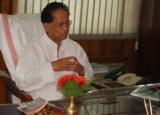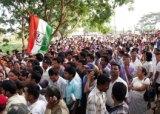Archives
Hat Trick For Congress in Assam
But yet the party performed very poor in Barak valley, which was identified as a BJP stronghold. The Bengali Hindu voters of the valley (around 20 per cent of Assam’s 3 crore population) bordering Bangladesh slowly turned to the Congress (more precisely Tarun Gogoi) for stability and development. The BJP continued winning in Barak valley in the last two Assembly polls (2001 and 2006), but this time the party drew a blank. The Congress candidates won 13 seats (out of 15) in the south Assam basin, where AGP and AIUDF shared the remaining two seats.
 The infighting among BJP leaders in Barak valley and also the division of votes between the BJP and AGP paved the way for the success of the Congress candidates there. The BJP had finally won only five seats in the Brahmaputra valley. The State BJP president Ranjit Dutta too faced the defeat.
The infighting among BJP leaders in Barak valley and also the division of votes between the BJP and AGP paved the way for the success of the Congress candidates there. The BJP had finally won only five seats in the Brahmaputra valley. The State BJP president Ranjit Dutta too faced the defeat.
With many promises to the people, Chief Minister Gogoi also played the Hindu card cleverly during the campaigning, when he commented that the Hindu Bangladeshi migrants might be considered as refugees. Gogoi however stated clearly that the Muslim people migrating from Bangladesh must not get sympathy. The message was seemingly clear that Gogoi would never compromise with the interest of indigenous people.
The worst performance was showed by the AGP. Emerging out of the historic Assam agitation (1979 to 1985), the party came to power for two terms (1985 to 1990 and 1996 to 2001) but could not maintain its stand on the core issue of illegal Bangladeshis.
From 65 MLAs in the 1985 Assembly elections, the party started loosing its number of legislators in succeeding elections. This time the party could retain only 10 seats (it had 24 MLAs in 12th Assam Legislative Assembly), meaning the AGP has lost the status of the main opposition party in the Assembly.
The President of AGP (CM Patowary) with many senior party leaders including Brindavon Goswami, Atul Bora, Kamala Kalita, Girin Baruah, Alaka Desai Sharma etc faced defeat. Only a few senor AGP leaders like PK Mahanta, Phanibhushan Choudhury, Padma Hazarika, Keshab Mahanta etc maintained their wining spirit.
The 13th Legislative Assembly will also miss some members with oratory skills like Bhuban Pegu (Gana Shakti), Ananta Deka (CPI-M), Drupad Borgohain (CPI), Aditya Langthasa (AIUDF) with Bharat Chandra Narah (Congress).
 The Bodoland People’s Front led by Hagrama Mohilary (which was allied to the ruling Congress) increased its number of MLAs to 12 (from 11 legislators last time). However the Left parties (Communist Party of India and Communist Party of India-Marxist) failed to win a single seat in the polls. Last time the CPI had one and the CPI (M) had two MLAs in the Assembly. Contrary to this, All India Trinamool Congress could win a seat in the State.
The Bodoland People’s Front led by Hagrama Mohilary (which was allied to the ruling Congress) increased its number of MLAs to 12 (from 11 legislators last time). However the Left parties (Communist Party of India and Communist Party of India-Marxist) failed to win a single seat in the polls. Last time the CPI had one and the CPI (M) had two MLAs in the Assembly. Contrary to this, All India Trinamool Congress could win a seat in the State.
The inspiring outcome was shown by the AIUDF, which has increased its tally to 18 this time. In fact the party led by Badaruddin Ajmal won 10 seats in 2006 election, which was its debut electoral appearance. The AIUDF continued mesmerizing the sizable Bengali Muslim population of the state. The minority inclined party surfaced as the second largest party in the Assembly after the Congress.
A leading English daily newspaper from Guwahati in an editorial argued that the increase of AIUDF influence in the Assembly elections “is a development that goes against the cause of the indigenous people of the state.”
“It can not augur well at all that a party that was born after the abrogation of the notorious, anti-national, pro-illegal Bangladeshi IM (DT) Act — a law effected by the Congress to consolidate its illegal Bangladeshi vote bank — should be in a position to elevate itself to the status of being the second largest party in the next Assembly,” added the editorial.
| 13th Assam Legislative Assembly |
|
Congress : 78 AIUDF : 18 BPF : 12 AGP : 10 BJP : 5 Independent : 2 TMC : 1 |
| (Total seats 126) |
The state (where Muslims form a sizeable 30% of the total electorate) has however increased the number of Muslim MLAs to 28 (it was 25 in the 2006 election) in the Assembly. Of course they represent various parties like the AIUDF, Congress and AGP. The elected prominent Muslim legislators are Rockybul Hussain, Abdul Muhib Mazumder, Rekibuddin Ahmed (from Congress), Sahidul Alam Choudhury (AGP) withSirajuddin Ajmal, Abdur Rahman Ajmal, Rafiqul Islam etc (AIUDF).
Meanwhile, a confident Tarun Gogoi aged 77 has taken the responsibility of Chief Minister for the consecutive third time and he was administered the oath of office by the Governor of Assam JB Patnaik in Raj Bhavan on the 18th of May. A host of dignitaries including BK Handique (Development of North Eastern Region minister), Dr Mukul Sangma (Meghalaya Chief Minister), APCC chief Bhubaneswar Kalita, senior
Congress leader Chandan Bagchi, Hagrama Mohilary (BPF chief) and others were present in Darbar hall, where Gogoi took oath in the local Assamese language.
A smiling Gogoi, who has scripted his success story as the second politician after BP Chaliha to lead the Assam government for the third consecutive term, maintained that the voters of Assam elected them for all the development work, stability and peace initiative (with various militant groups including ULFA). He also asserted that the electorate of Assam has become wise and conscious today and no political party should dare to underestimate them in their judgment.
“We will continue focusing on development programmes that help in solving the problems of unemployment, poverty, illiteracy etc,” said Gogoi, while talking to the media persons soon after his oath adding that his new thrust area would be the education and health sectors.
Many political analysts believe that Gogoi’s initiative for peace talks with leaders of United Liberation Front of Asom,
National Democratic Front of Bodoland, Dima Halam Daoga helped the party in garnering votes. At least a majority of the general population, who want a peaceful and decent livelihood, started reposing faith on Gogoi as a sensitive and pro-active leader of the state.
Gogoi was also instrumental in establishing the fact that the Congress is no longer solely dependent on Muslim votes today as it was earlier. In fact, the Congress was once known as the party of Ali (read Muslim). But the shrewdness
of Gogoi has finally attracted the mainstream Assamese voters (predominantly Hindu) for the party and the political observers strongly believe that the national party was voted for repeatedly and predominantly by those mainstream Assamese voters.
Nava Thakuria

